Timing is crucial in duck diving. You can enhance your timing by spending time in the water, studying wave patterns, and practicing. Observing experienced surfers can also provide valuable insights.
HOW TO DUCK DIVE ON A SURFBOARD: AN OUTER REEF STEP-BY-STEP GUIDE
Duck diving is a fundamental technique in surfing that allows you to paddle out through breaking waves more efficiently. Mastering the duck dive is essential for surfers of all levels. Whether you're a beginner or an experienced rider, here's how to perform a duck dive on a surfboard to navigate the waves with confidence.
QUICK OVERVIEW: THE SIX KEY STEPS
Step 1: Paddle Towards the Wave
Step 2: Grab the Rails
Step 3: Push the Board Down
Step 4: Knee or Foot
Step 5: Clear the Wave
Step 6: Resume Paddling
STEP 1: PADDLE TOWARDS THE WAVE
Initiate your paddle towards the approaching wave. Perfect your timing so that you meet the wave just before it breaks. Maintaining adequate momentum is essential for a successful duck dive.
STEP 2: GRAB THE RAILS
As you approach the wave, firmly grip the rails (sides) of your surfboard with both hands. Ensure your hands are directly under your shoulders, fingers securely clutching the board's edges.
STEP 3: PUSH THE BOARD DOWN
Utilize your arm strength and upper body to push the board's front underwater. Simultaneously, arch your back and press your chest onto the board, submerging it beneath the water's surface.
STEP 4: KNEE OR FOOT
While pushing the board down, position your knee (or foot for added depth) onto the tail. This action facilitates the board's smooth passage beneath the wave. Keep one foot elevated, and as the wave touches your raised leg, execute a forceful kick to maintain forward momentum.
STEP 5: CLEAR THE WAVE
As the wave rolls over you, continue pushing the board forward while gripping the rails, maintaining your submerged position. In larger waves, a powerful kick can aid this process. Once the wave has passed, release your grip, and utilize your arms to resurface the board.
STEP 6: RESUME PADDLING
After successfully clearing the wave, resurface and regain balance. Resume paddling while keeping an eye on the next wave, ready to repeat the duck dive if necessary.
DUCK DIVING TIPS:
-
Timing is Key: To execute a successful duck dive, impeccable timing is imperative. Perform the duck dive just before the wave breaks to minimize impact and maximize efficiency.
-
Practice Makes Perfect: Duck diving may pose challenges for beginners, demanding coordination, strength, and timing. Begin by practicing in smaller, manageable waves before tackling larger ones.
-
Stay Calm: Maintaining composure throughout the process is vital. Concentrate on your technique and remain relaxed to conserve energy.
Remember, mastery of the duck dive requires dedication and persistence. With practice, you'll enhance your skills and confidently navigate the waves. Enjoy your surfing adventures while staying safe!
COMMON MISTAKES AND HOW TO AVOID THEM:
Surfing is a skill that takes time to master, and duck diving is no exception. Here are some common mistakes surfers make during duck dives, along with tips on how to avoid them:
-
Premature Duck Dive: Trying to dive too early before reaching the wave can disrupt your timing. To avoid this, wait until you're as close to the wave as possible before executing the duck dive.
-
Inadequate Push: Not using enough upper body strength can result in the board not submerging properly. Ensure you exert enough force when pushing down.
-
Incorrect Foot Placement: Placing your knee or foot incorrectly can affect your balance. Make sure your knee or foot placement allows for optimal control and buoyancy.
SAFETY PRECAUTIONS:
Safety should always be a top priority. Here are some essential safety precautions to keep in mind when practicing duck diving:
-
Know Your Skill Level: Assess your own skill level and only attempt duck diving when you're confident in your swimming and board handling abilities.
-
Understanding Your Limits: Recognize when conditions are too challenging for duck diving. Sometimes it's wiser to paddle out through the waves instead of attempting a dive in rough waters.
-
Weather Considerations: Be mindful of how weather conditions, including wind and tide, can impact wave behavior and adjust your strategy accordingly.
REAL-LIFE EXAMPLES (TESTIMONIALS):
Hear from fellow surfers who've mastered the duck dive. Their experiences and tips can inspire you to improve your skills and navigate the waves confidently.
John's Success Story: John, a dedicated surfer, recalls his experiences when learning to duck dive. He shares, "Before mastering the duck dive, I struggled to paddle out through breaking waves. Often, I'd be tossed around and waste precious energy. But after learning the technique using Outer Reef's guide, my experience changed completely. Now, I can efficiently navigate those waves, saving energy for the real fun – riding them!"
Sarah's Surfing Journey: Sarah, a novice surfer, embarked on her surfing journey with Outer Reef's guide on duck diving. She notes, "Starting out, duck diving seemed daunting. The Outer Reef guide simplified the process with clear steps and helpful tips. Through practice and perseverance, I now confidently perform duck dives. It's a remarkable feeling – conquering the waves and staying in control."
SEASONAL CONSIDERATIONS:
Different seasons can bring various wave conditions. Here's how seasonal changes can affect your duck diving technique:
-
Summer Swells: Summer waves are typically smaller and less powerful. Duck diving might require less effort, making it an ideal time for beginners to practice.
-
Winter Swells: Winter swells can bring larger, more powerful waves. Adjust your technique to account for the increased force of the waves.
COMMUNITY AND RESOURCES:
Joining a surf community and exploring additional resources can enhance your surf knowledge. Here are some recommendations:
-
Outer Reef: Connect with other surfers in our vibrant after school surf community club. Share experiences, ask questions, and learn from fellow wave riders.
-
Local Salty Sisters: If you're looking for hands-on instruction, consider enrolling in one of our local surf sessions. We offer courses catering to all skill levels. Come join us on the water!
RECOMMENDED READING:
Check out these recommended books and articles to deepen your understanding of surfing techniques and ocean knowledge.
-
"The Surfer's Mind" by Richard Bennett
- This book delves into the psychological aspects of surfing and explores how mental focus and attitude can impact your surfing performance. It provides valuable insights into achieving the right mindset for successful surfing.
-
"Barbarian Days: A Surfing Life" by William Finnegan
- A beautifully written memoir by a lifelong surfer, this book provides a captivating account of the author's experiences with surfing around the world. It's a must-read for anyone looking to immerse themselves in the surfing lifestyle and culture.
-
"The History of Surfing" by Matt Warshaw
- This comprehensive book offers an in-depth look at the history and evolution of surfing. From its ancient roots to the modern sport, it provides a detailed exploration of how surfing has developed over time.
These books cover a range of topics, from the mental aspects of surfing to the sport's history and personal experiences, offering a well-rounded selection for surfers and enthusiasts alike.
CONCLUSION:
- Duck diving is a skill that improves with practice, dedication, and safety awareness. As you master this technique, you'll ride the waves with confidence, knowing how to efficiently navigate them. Stay safe and enjoy your surfing adventures!
CONNECT WITH OUR SURF COMMUNITY
Ask questions, and share your experiences. Explore more of our surfing resources and subscribe for regular updates.
FAQ: DUCK DIVING ON A SURFBOARD
HOW CAN I IMPROVE MY TIMING FOR DUCK DIVING?
IS DUCK DIVING CHALLENGING FOR BEGINNERS?
Yes, duck diving can be challenging for beginners. It requires a combination of coordination, strength, and timing. We recommend starting with smaller, manageable waves to build your confidence and skills.
WHAT SHOULD I DO IF I PANIC DURING A DUCK DIVE?
Remaining calm is essential. If you feel panicked, surface immediately, regain your composure, and try again. It's important not to rush the learning process. Practice in a safe environment and at your own pace.
CAN I DUCK DIVE IN ANY WAVE CONDITIONS?
Duck diving is most effective in smaller to medium-sized waves. In larger or extremely powerful waves, duck diving may not be as efficient, and it's often safer to turtle roll (rolling your board over) or use other techniques.
HOW LONG DOES IT TAKE TO MASTER THE DUCK DIVE?
Mastery of the duck dive varies from person to person. With consistent practice and dedication, you can expect to make noticeable improvements within a few weeks or months. However, it's an ongoing skill that you'll continue to refine throughout your surfing journey.
ADVANCED TIPS FOR SEASONED SURFERS:
-
Wave Selection: Choose the right waves to duck dive. Smaller, slower waves are ideal for practice.
-
Reading the Ocean: Understanding wave patterns, tide, and wind conditions can greatly aid your duck diving.
-
Equipment Matters: The volume, shape, and buoyancy of your board can impact your duck diving abilities. Experiment with different boards to find the best fit for you.
-
Be Mindful of Others: When surfing in crowded lineups, always prioritize safety and the well-being of other surfers when performing a duck dive.



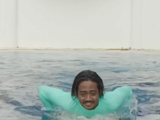
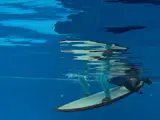
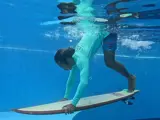

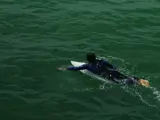
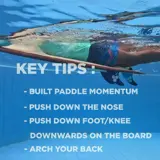
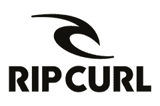
























About the author
Dean Gough